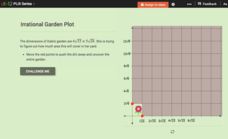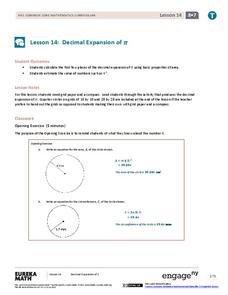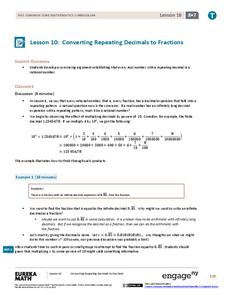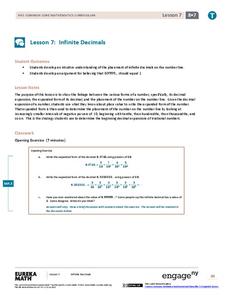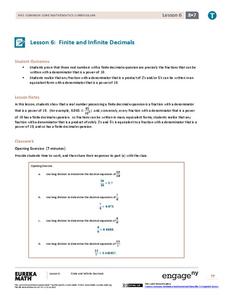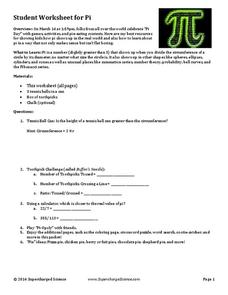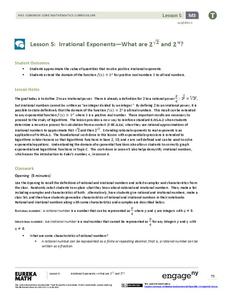Mathematics Vision Project
Quadratic Equations
Through a variety of physical and theoretical situations, learners are led through the development of some of the deepest concepts in high school mathematics. Complex numbers, the fundamental theorem of algebra and rational exponents...
Didax
Pi Day #1a – Discovering Pi
Unravel the mystery behind the infamous number pi. Scholars complete a series of activities that explores where pi comes from, its digits and estimation strategies. Pupils should be ready to measure, calculate, and look for patterns to...
CCSS Math Activities
Smarter Balanced Sample Items: 8th Grade Math – Claim 3
Communication is the key. A dozen sample items require scholars to communicate their reasoning involved in arriving at a solution. The PowerPoint from the Gr. 8 Claim 2 - 4 Item Slide Shows series uses a variety of content to illicit...
CCSS Math Activities
Smarter Balanced Sample Items: 8th Grade Math – Target A
Take an irrational approach to numbers with a Smarter Balanced assessment that covers the introduction of irrational numbers. The nine items cover identifying irrational numbers, approximating them with rational numbers, and converting...
CCSS Math Activities
Smarter Balanced Sample Items: High School Math – Claim 3
Communication is the key. A presentation provides 25 sample items for Claim 3, Communicating Reasoning, for the Smarter Balanced High School Math assessment. Items require pupils to answer the question and provide logical reasoning to...
CCSS Math Activities
Smarter Balanced Sample Items: High School Math – Target B
There are only two options to consider: rational or irrational. Pupils review rational and irrational numbers by answering a set of eight questions provided in a PowerPoint presentation. Part of larger Claim 1 Item Slide Show series, the...
5280 Math
Decimal Patterns
Find patterns in the process instead of the result. Learners convert series of decimals and fractions identifying patterns along the way. The lesson includes nine problem tasks with progressively more involved patterns.
Education Development Center
Sum of Rational and Irrational is Irrational
Sometimes the indirect path is best. Scholars determine whether the sum of a rational number and an irrational number is irrational. Reading a transcript of a conversation between classmates leads to an indirect proof of this concept.
CK-12 Foundation
Square Roots and Irrational Numbers: Estimating Radicals
Try out a resource using triangles to estimate radicals. An interactive app allows learners to approximate some irrational numbers involving square roots. They find the two consecutive numbers that an irrational number lies between by...
CK-12 Foundation
Simplification of Radical Expressions: Irrational Garden Plot
All is not simple in the garden of rationals and irrationals. Learners use a context of a garden to practice simplifying irrational numbers involving radicals. They also find areas of garden with irrational side lengths.
EngageNY
Mid-Module Assessment Task: Grade 8 Module 7
Assess pupil understanding of rational and irrational numbers with a mid-module assessment that is the 15th lesson in the 25-part series. The questions represent the objectives in the first half of the series. Topics include decimal...
EngageNY
Decimal Expansion of Pi
Develop a better understanding of the value of pi. Learners explore the area of a circle using estimation and graph paper. While continuing to estimate the area of the circle using smaller and smaller grids, the number pi emerges.
EngageNY
Converting Repeating Decimals to Fractions
Develop a process with your classes for converting repeating decimals to fractions. Through this process, pupils understand that any repeating decimal can be written as a fraction. The 10th lesson in this 25-part module helps reinforce...
EngageNY
Infinite Decimals
Can you support the argument that the decimal 0.99999 ... is equivalent to the number one? The seventh installment in this 25-part module gives convincing support for this conclusion. Pupils write infinite decimals using powers of 10....
EngageNY
Comparing Irrational Numbers
Build on your classes' understanding of irrational numbers by comparing their values. The 13th lesson in the 25-part module has individuals estimate values of both perfect and non-perfect roots. They finish by graphing these numbers on a...
EngageNY
Decimal Expansions of Fractions, Part 2
Develop your pupils' understanding of fractions and their decimal equivalence using the 12th lesson in this series. Scholars learn an alternative to long division that results in converting fractions to decimals that emphasize fractional...
EngageNY
The Decimal Expansion of Some Irrational Numbers
Develop a definition of irrational numbers through an exploration of square roots. The 11th instructional activity in this series of 25 asks scholars to estimate the value of a square root. Learners observe as the estimation extends...
EngageNY
Decimal Expansions of Fractions, Part 1
Is it possible to add infinitely long decimals? As pupils complete the examples in the ninth lesson of this 25-part series, they determine that adding these decimals cannot be done without error. Their task is then to determine the size...
EngageNY
The Long Division Algorithm
Two methods are always better than one! The eighth installment in this series asks pupils to convert decimals to fractions using two approaches. Individuals first use the more traditional approach of long division and then use reverse...
EngageNY
Finite and Infinite Decimals
Explore the patterns of fractions that produce finite and infinite decimals. The sixth lesson of the series asks learners to determine a similar feature of fractions that produce finite decimals. Using the patterns, pupils create...
Curated OER
Worksheet for Pi
Who needs a pie-eating contest when you have a pi-ology game! Celebrate March 14th with a fun board game about pi and other geometric concepts. As learners answer questions about geometry, they move around the board to collect tokens.
Inside Mathematics
Rugs
The class braids irrational numbers, Pythagoras, and perimeter together. The mini-assessment requires scholars to use irrational numbers and the Pythagorean Theorem to find perimeters of rugs. The rugs are rectangular, triangular,...
EngageNY
Irrational Exponents—What are 2^√2 and 2^π?
Extend the concept of exponents to irrational numbers. In the fifth installment of a 35-part module, individuals use calculators and rational exponents to estimate the values of 2^(sqrt(2)) and 2^(pi). The final goal is to show that the...
EngageNY
Rational and Irrational Numbers
Back to the basics: learning how to add numbers. The 17th installment of a 35-part module first reviews addition techniques for rational numbers, such as graphical methods (number line) and numerical methods (standard algorithm). It goes...











